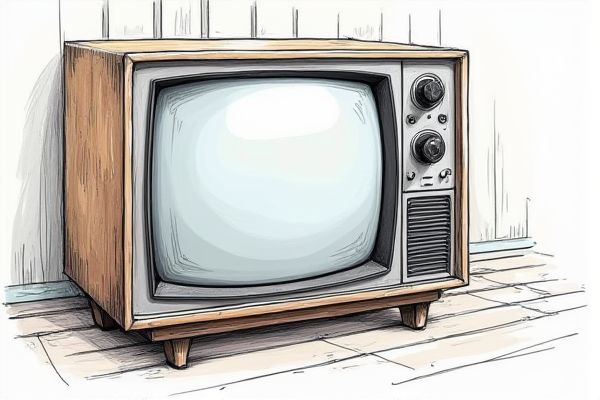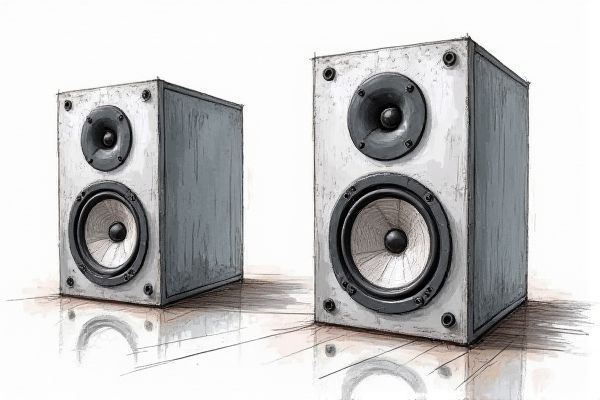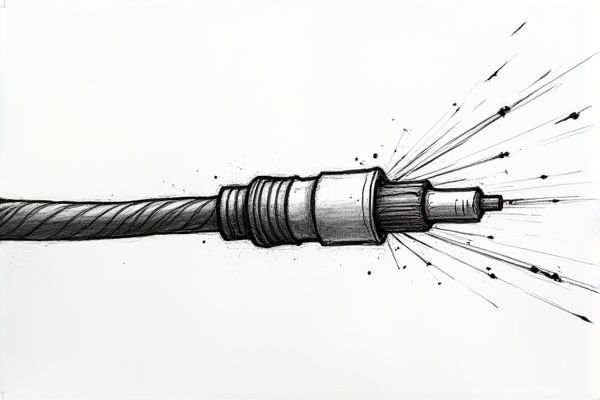In an ever-evolving world of technology, choosing the right television brand can significantly enhance your viewing experience. With a plethora of options available, selecting a brand that offers high-quality visuals, robust features, and reliable customer support is essential. Among the top contenders in the market are renowned names that have consistently provided cutting-edge designs and unbeatable performance. Join us as we explore the leading television brands that stand out in 2023, offering exceptional value and innovation below.

Illustration of television
Best brands of television in 2025
Samsung
Samsung Electronics has solidified its position as a leading television manufacturer, maintaining its dominance in the global TV market for an unprecedented 18 consecutive years since 2006. The company achieved a 30.1% share of the global TV market in 2023, with a significant 60.5% market share for TVs priced over $2,500 and a 33.9% share for TVs over 75 inches. Samsung's QLED TV lineup has surpassed cumulative sales of 40 million units since its launch in 2017, with 8.31 million units sold in 2023 alone. The company also made notable strides in the OLED sector, capturing a 22.7% market share in 2023. Samsung continues to innovate with the introduction of the NQ8 AI Gen3 processor, set to redefine the smart TV domain. For more details on Samsung's market leadership, visit their official announcement.
LG
LG Electronics is a leading manufacturer in the television market, particularly dominating the OLED TV segment with a 52% market share in the first quarter of 2024, shipping approximately 627,000 OLED TV units. In the super large OLED TV market, LG held a 53% share for 70-inch and above models and a 58.4% share for 80-inch and above models, led by its 97-inch OLED TV. Despite facing competition, LG maintained a significant presence, shipping 5.41 million TV units in the first quarter, accounting for 16.6% of global TV shipments in terms of value. LG's focus on premium and super large products, along with its AI quality and sound chip "Alpha AI Processor," continues to drive its strategy. The company's OLED TVs accounted for about 28% of LG Electronics' TV revenue in the first quarter.
Sony
Sony is renowned as one of the leading television manufacturers globally, having held the position as the world's biggest T.V. seller in 2023 with a market share of 27%. The company saw significant growth in smart TV purchases, particularly with the release of new Google TV Bravia models in 2021, which helped it rise to the top three in the US smart TV market. Sony's TVs are highly regarded for their picture quality, with 34% of respondents citing this as a reason for purchase, and 72% of users being male. The company also dominates the premium TV market for televisions over 55 inches and priced above $2,500. Additionally, Sony's smart Android TVs account for 36% of the types of Sony TVs purchased by users. For more information about their products, visit Sony's official website.
TCL
TCL has solidified its position as one of the leading television manufacturers globally, capturing 12.6% of the global TV market share in Q1 2024, up from 11.9% the previous year. The company has achieved this through aggressive marketing and pricing strategies, as well as innovations like its MiniLED TV technology, which is expected to surpass OLED TV shipments by 2027. TCL has maintained its second position in the global TV market for two consecutive years, with 25.26 million units shipped in 2023, representing a 12.5% market share. The company's premium TV offerings, including the world's largest 115-inch MiniLED TV, have driven significant growth. With over 30 manufacturing facilities and 42 R&D centers worldwide, TCL continues to enhance its product portfolio and user experience. For more information on their televisions, you can visit the TCL TV product page.
Vizio
Vizio is a prominent brand in the television market, known for its affordable and high-value TVs, although it has faced recent challenges. As of 2024, Vizio's market share stands at 10.4%, and the company has seen a 3.28% decline in revenue to $1.68 billion over the last 12 months. Despite this, Vizio's advertising business, particularly through its SmartCast platform, has shown significant growth, with a 35% increase in ad revenue in the last quarter. The company's SmartCast operating system supports over 18 million active users and generates substantial revenue from targeted advertisements. Walmart's acquisition of Vizio for $2.3 billion aims to leverage Vizio's ad business and user data to enhance Walmart's advertising capabilities. For more insights on Vizio TVs, you can visit RTINGS' comprehensive review.
Panasonic
Panasonic is a renowned brand in the television industry, known for its high-quality and innovative products. As of 2023, Panasonic's Smart TV sales are distributed with 50% in 1080p resolution, 40% in 4K, and 10% in 8K resolution, showcasing its diverse range of offerings. Although not the market leader, Panasonic holds a significant presence in the global TV market. In the first half of 2022, Panasonic was ranked fourth globally with a 10% market share according to SNE research. The company's commitment to technology, such as incorporating patents from Pioneer's Kuro plasma HDTV displays, enhances its product lineup.
Hisense
Hisense has solidified its position as one of the leading television manufacturers globally, achieving a 12.1% volume share of shipment and ranking second worldwide in Q2 2022, according to Omdia. In Q3 2024, Hisense secured a 24% market share in the global high-end TV market and maintained its top spot in China with a 23.8% revenue share. The company dominates the 100-inch TV market and has seen a significant 102% year-on-year increase in Mini LED TV shipments. Hisense's innovative products, including Laser TVs priced between $3,000-$5,000, have been well-received internationally. The brand has also been recognized for its excellence, featuring in the Kantar BrandZ™ Top 10 Chinese Global Brands list for eight consecutive years. For more details on their achievements, visit Hisense's official news portal.
Philips
Philips, although not currently a leading brand in the TV market, boasts a rich history and significant presence in various consumer electronics sectors. However, the TV market is predominantly dominated by brands like Samsung, LG, and Sony, with Samsung holding a 31% market share in 2019, followed by LG with 16.3%, and Sony with 9.4%. Philips' strengths lie more in areas such as healthcare technology and home appliances, where they have made significant contributions and achieved substantial revenue, like EUR 19.72 billion in the financial year 2023. The company's focus on innovation and global reach has improved the lives of 1.88 billion people worldwide through their products and solutions. Despite this, their TV segment is not as prominent as other major TV manufacturers. For more details, visit their official Philips website.
Sharp
Sharp Corporation has been a leading producer of televisions, particularly in the LCD TV market, where it has historically held a significant position. In the fiscal year ending March 2006, Sharp achieved record sales and profits, with LCD TV sales reaching 4 million units and forecasted to increase to 6 million units the following year. Despite exiting the TV market in the Americas (except Brazil) in 2015, Sharp remains the biggest television brand in the Japanese market. As of 2015, Sharp's television market share in North America was 4.6%, and it was the tenth-largest television manufacturer globally by market share. The company continues to focus on high-price, large-size TV sets to maintain revenue growth. For more details about their innovations and products, visit their official website.
Toshiba
Toshiba, though it has scaled back its TV business, remains a notable brand in the television market, particularly known for its high-quality displays and smart features. In 2024, Toshiba's televisions accounted for 5.5% of the global television market, with 3.2 million units sold and a revenue of $2.1 billion, which is 6.2% of Toshiba's total revenue. However, it's important to note that Toshiba sold 95% of its TV business unit to Hisense in 2017, significantly reducing its market share to below 3%. For more detailed insights, visit the Toshiba statistics page.
















Leave a Reply
Your email address will not be published.